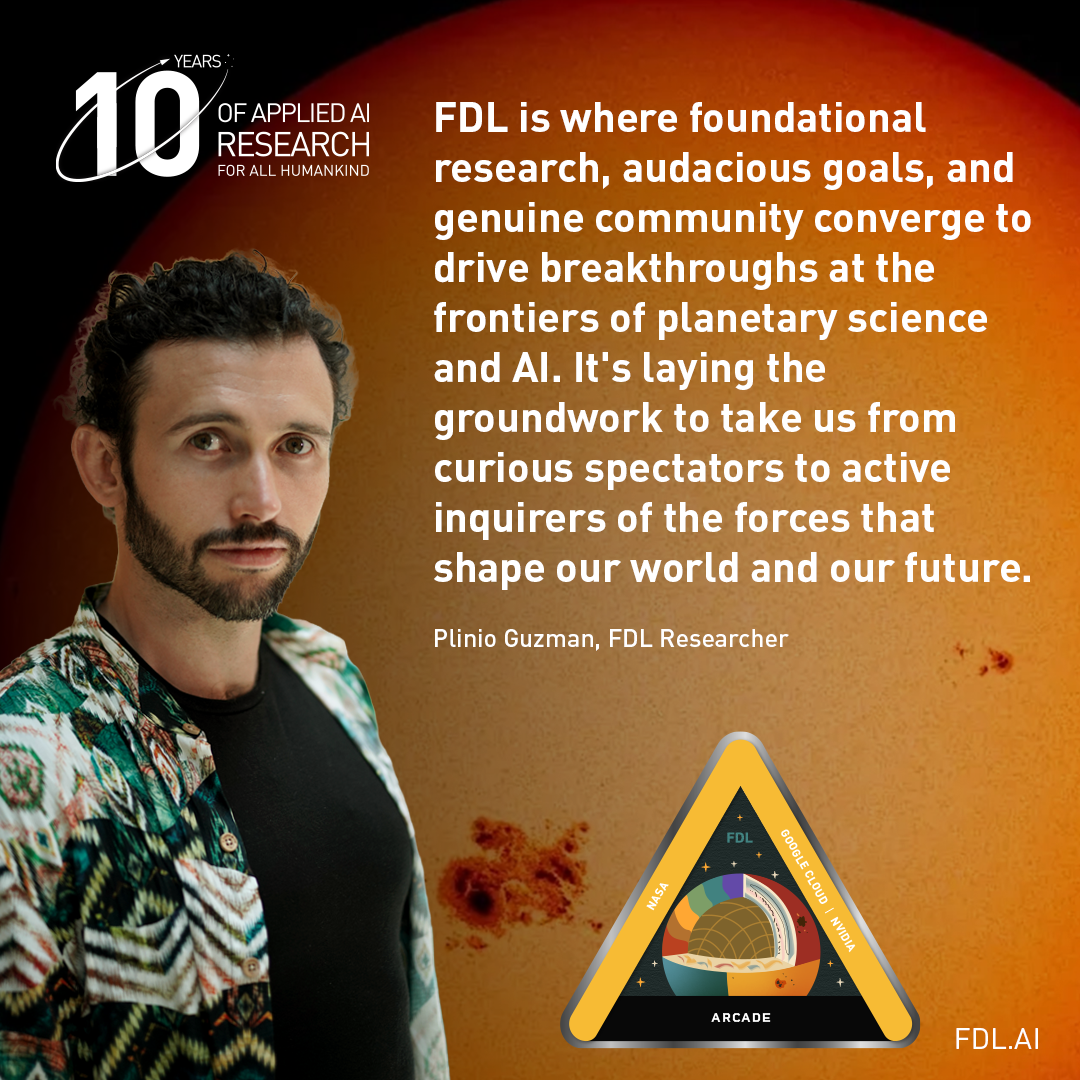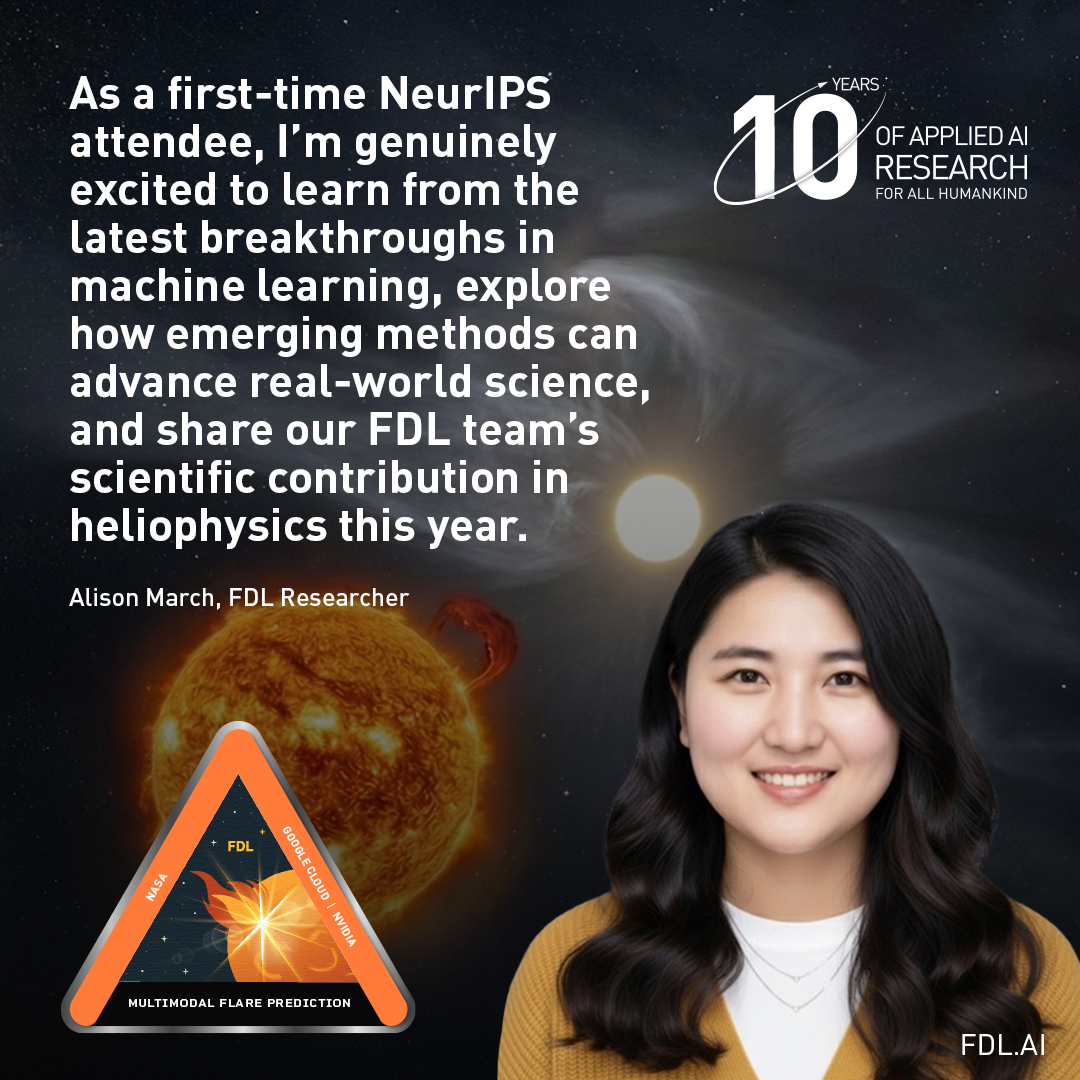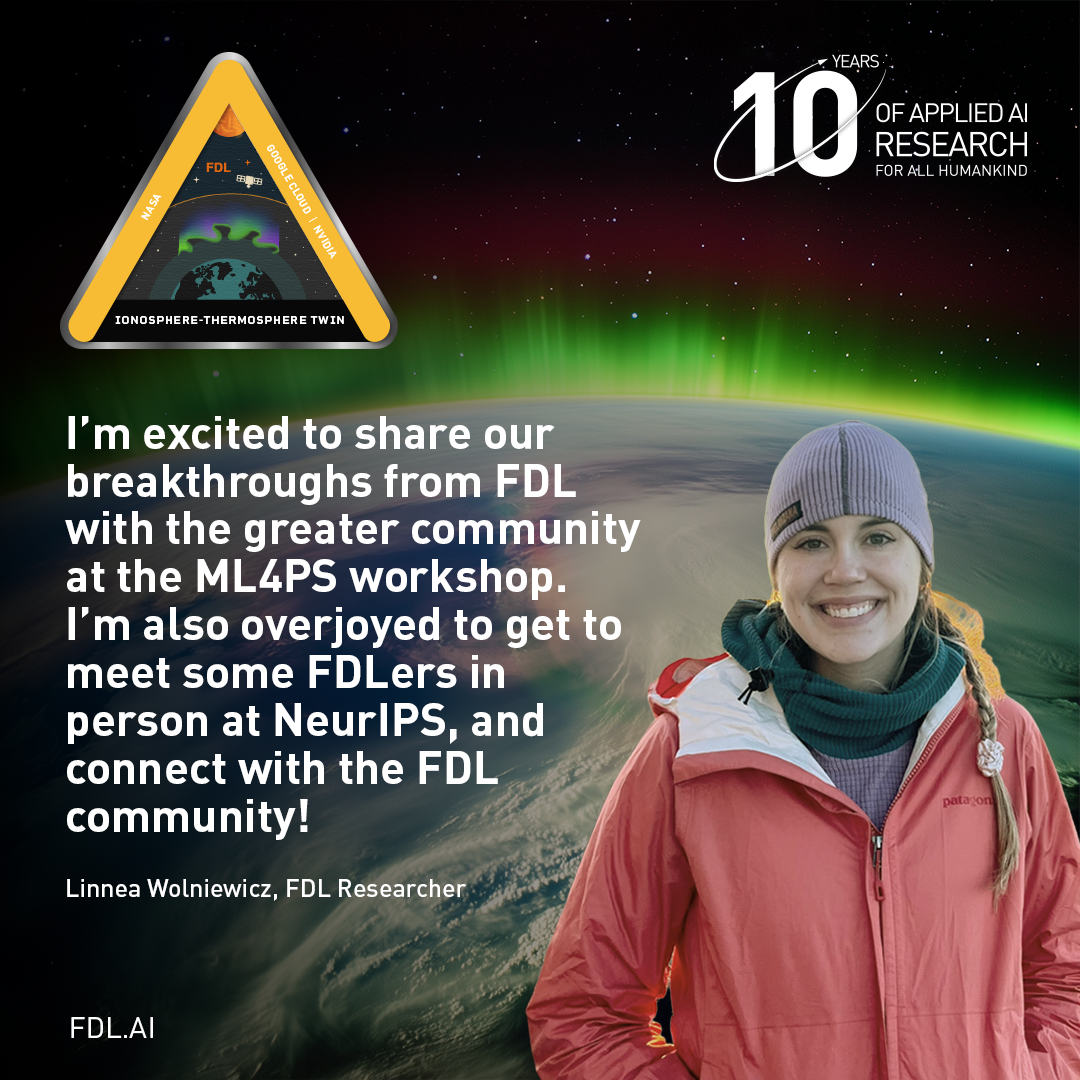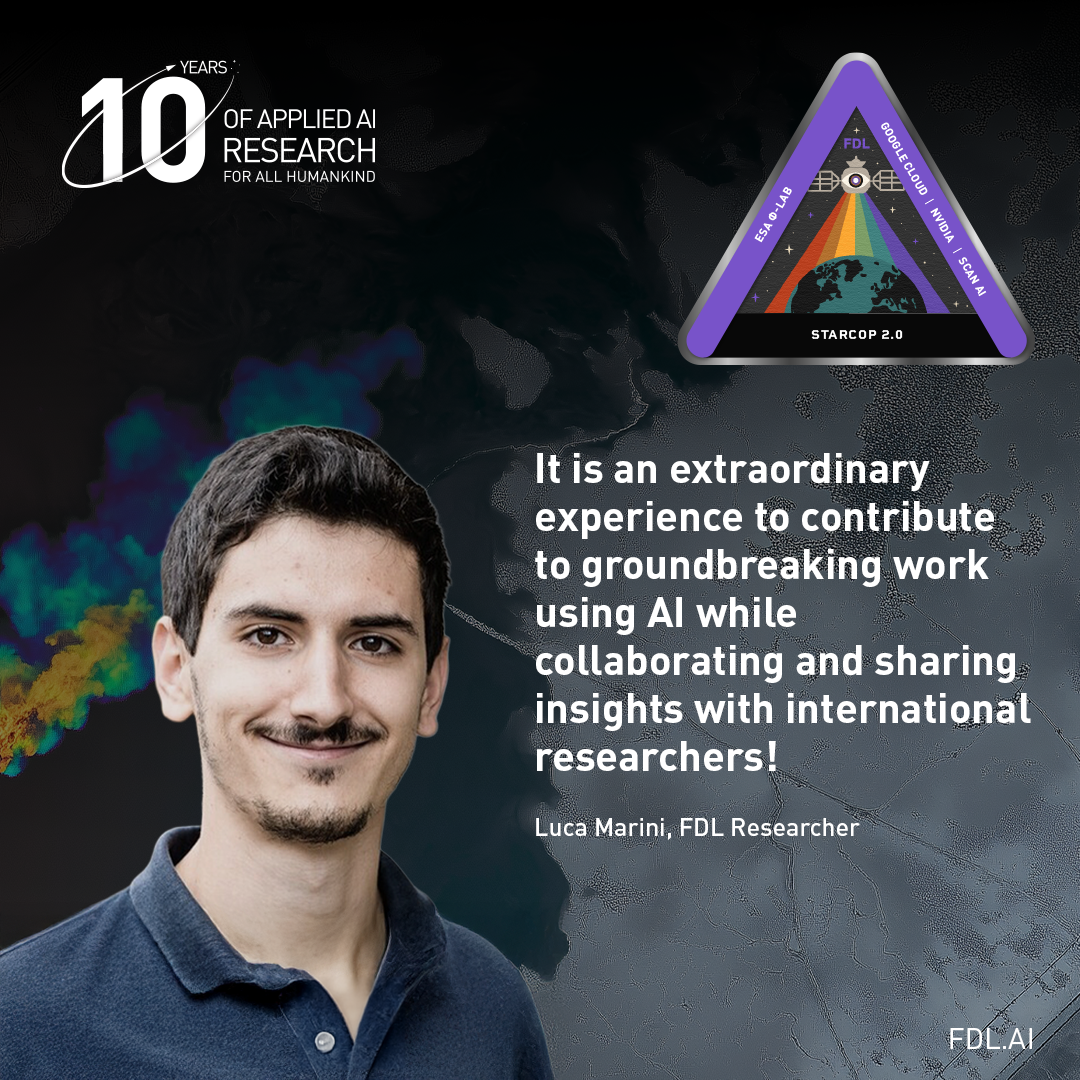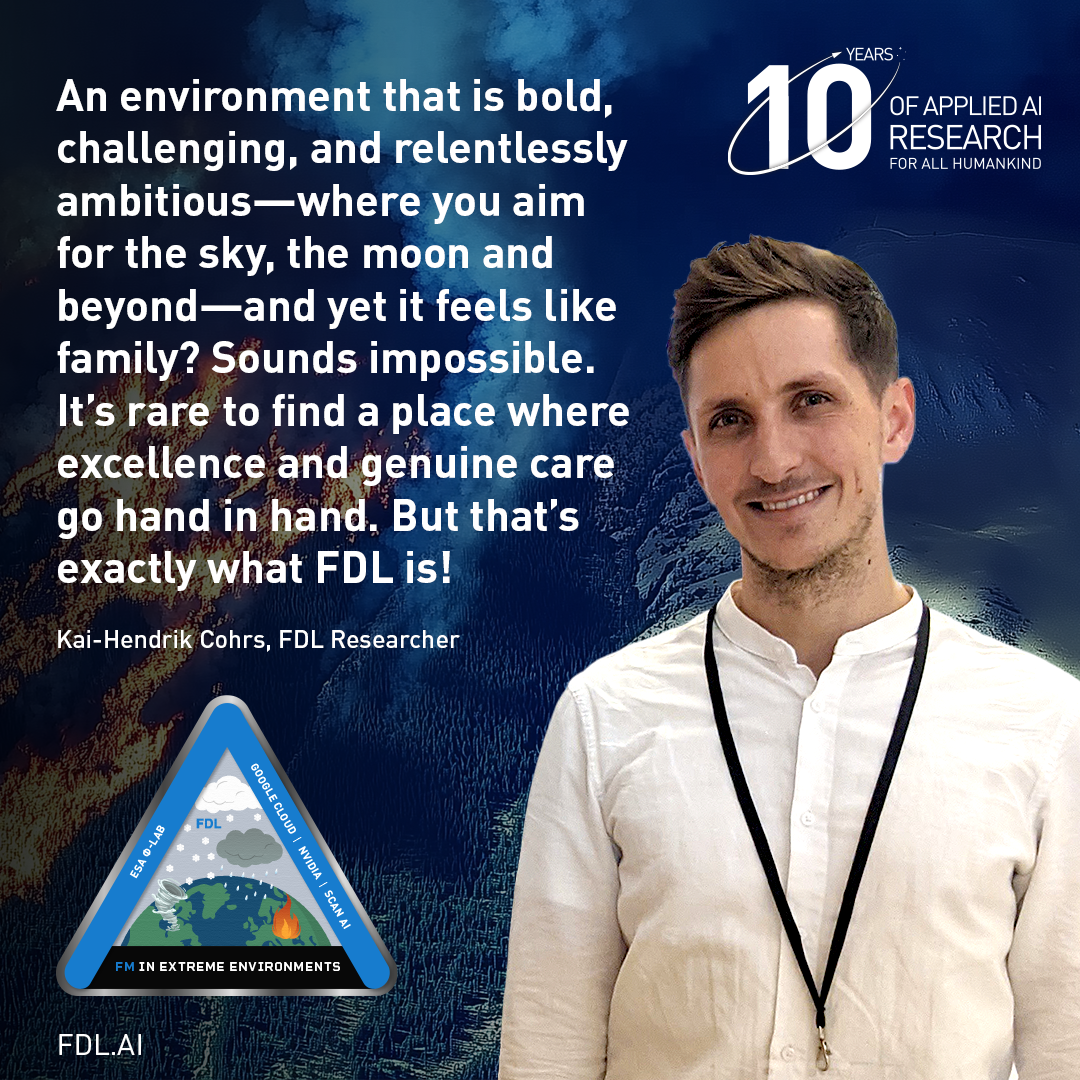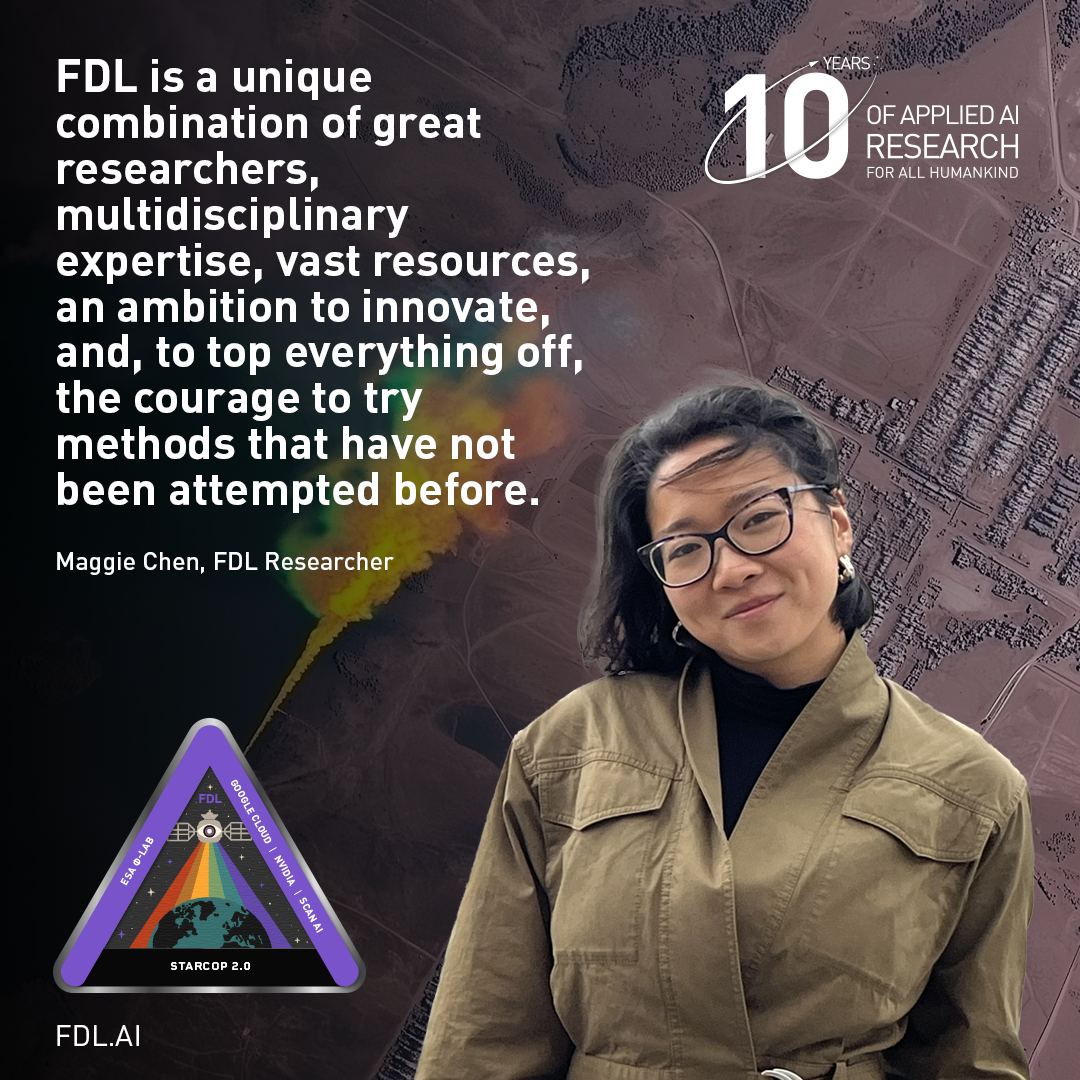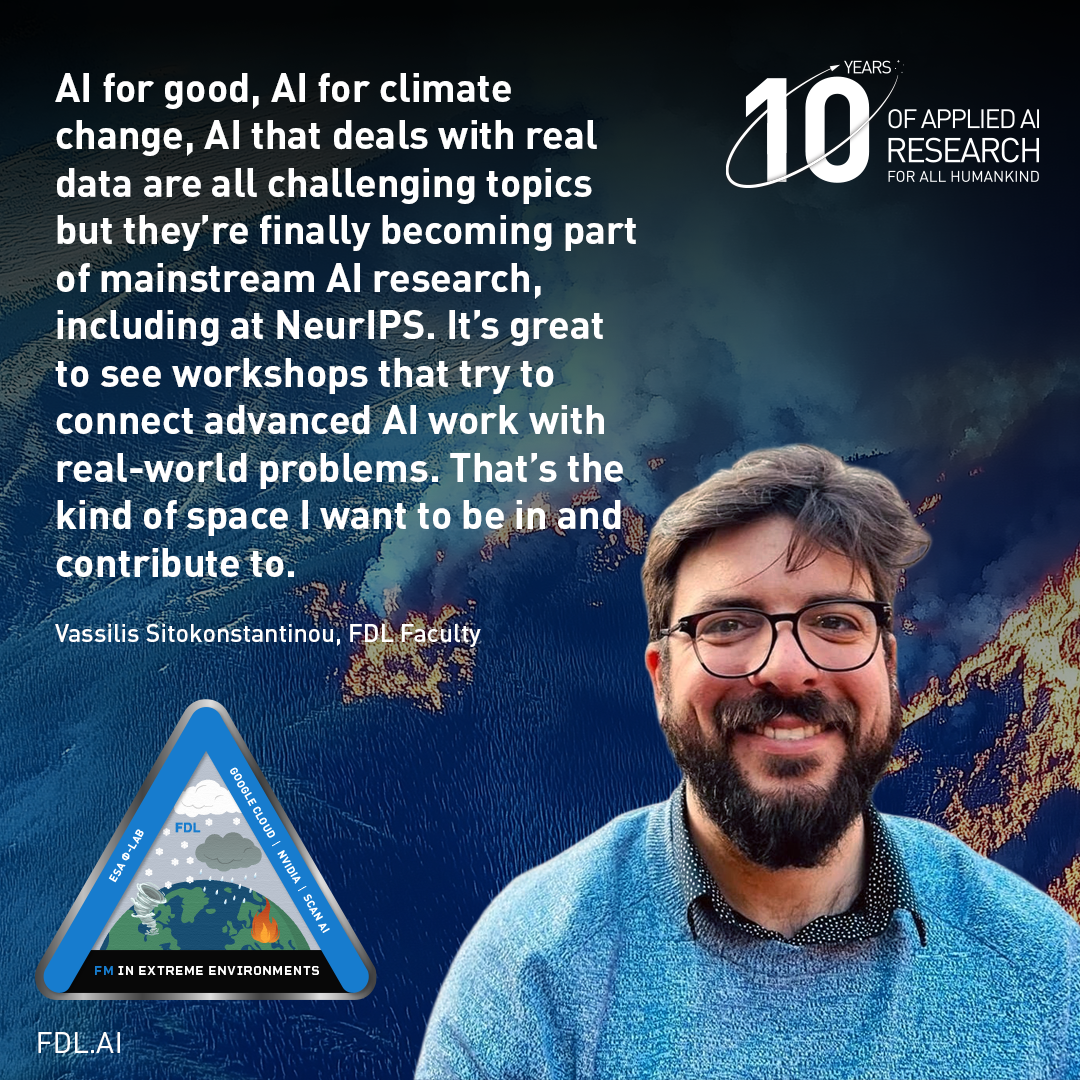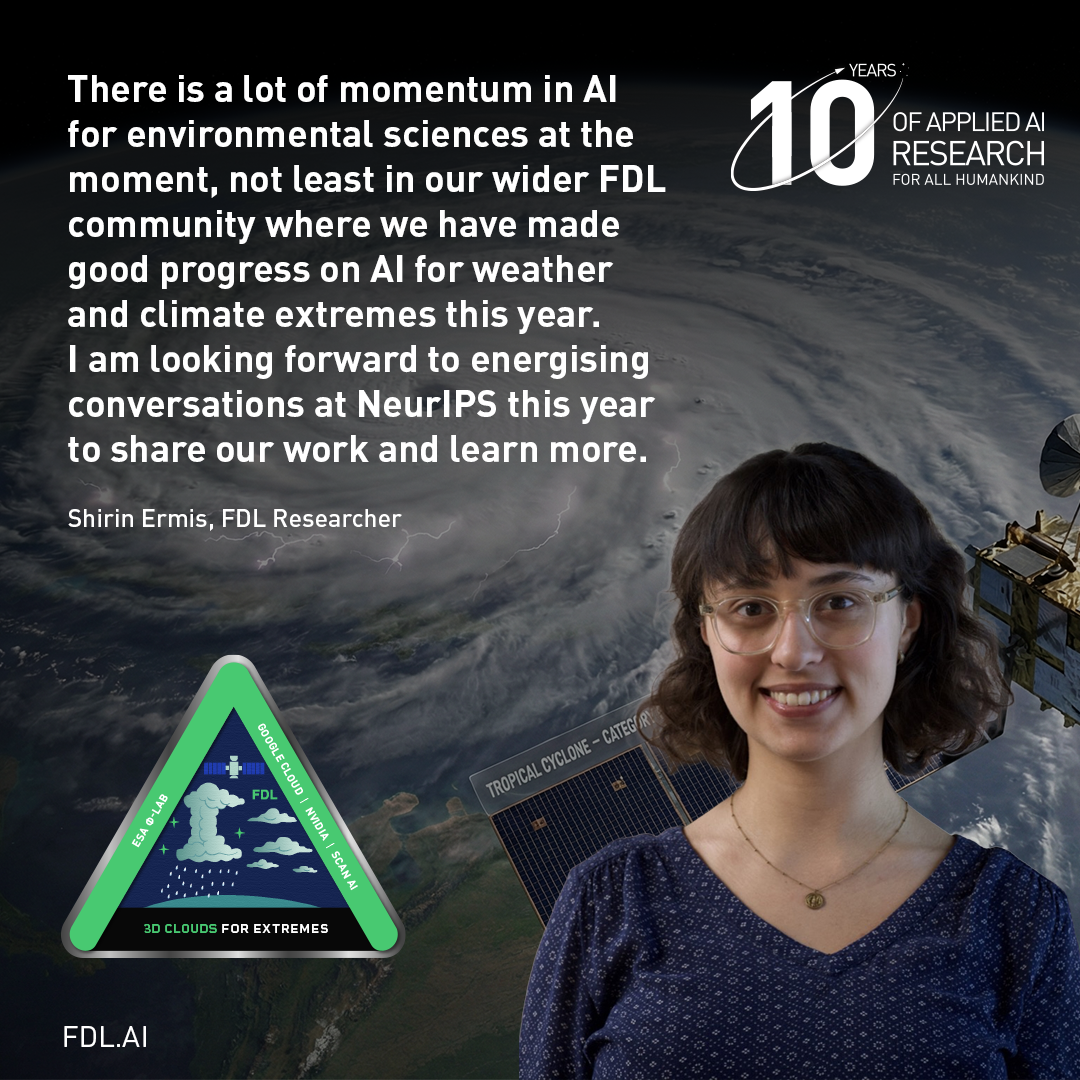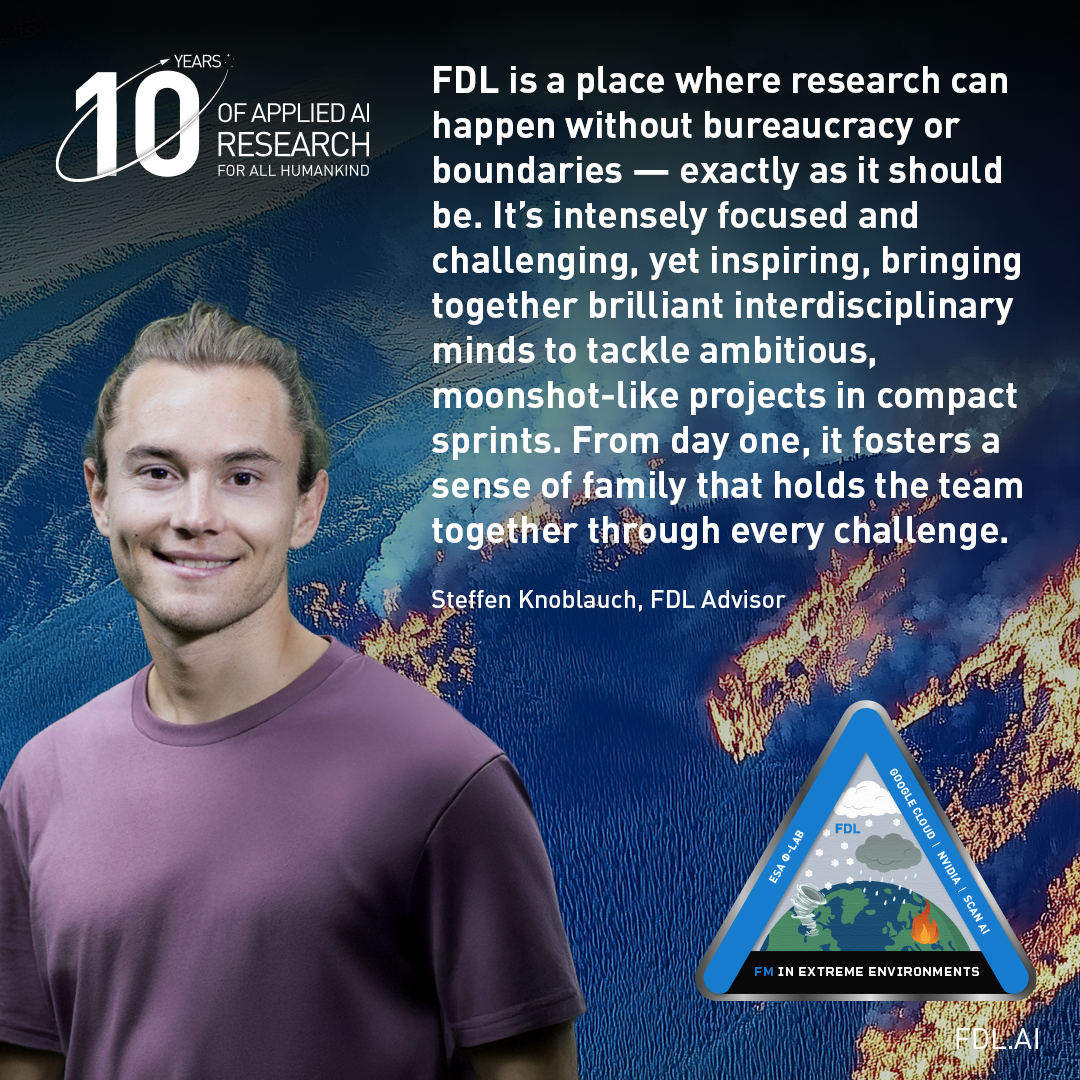
ApplicationS are now open for FDL 2026
You can now APPLY for the 2026 research cycles for Heliolab, Lunarlab and Earth Systems Lab, Flightlab and FDL Med, while we continue to refine the research challenges.
Please check our dedicated FAQ section below for more information. Make sure to follow our Linkedin and X or subscribe here to stay informed on any updates including our information sessions for the 2026 research cycle and results from 2025.
You can also contact fdlrecruitment@fdl.ai with any questions.
FDL.AI 2026 INFORMATION SESSIONS
The 2026 FDL Horizons : A Deep Dive into FDL information sessions will be held on the dates below:
FDL Horizons: A Deep Dive into ESL 2026: Wednesday, 25 February 2026
FDL Horizons: A Deep Dive into Lunarlab 2026: Thursday, 26 February 2026
FDL Horizons: A Deep Dive into Heliolab 2026: Friday, 27 February 2026
WHY fdl?
a primer for professors and supervisors
FDL.AI 2025 INFORMATION SESSIONS
The 2025 information sessions were held in late February 2025. In case you missed it, we recorded them for you - find links to these insightful discussions below!
WHY APPLY?
Be part of the team
Interdisciplinary teamwork is at the heart of the FDL.AI philosophy, and our experience has shown that a mix of skill sets creates results far greater than the sum of their individual parts. Working closely during the eight-week research sprints, teams achieve outputs that might otherwise take years.
Our growing international network provides great value for its members, many of whom have continued work on projects they began at FDL.AI.
Researchers have also gone on to join some of the world’s most prestigious technology, Earth Observation companies and academic institutions in a variety of roles. FDL.AI projects have been featured in peer-reviewed journals, conference presentations, posters and numerous news features.
Build best practiceS
Best practices in artificial intelligence are still emerging, and FDL.AI is at the forefront of developing effective workflows for AI development in the space sector. Our team-focused approach enables an expertise chain that can tackle problem definition, data source aggregation, workflow composition, algorithm development, creation of inference models and deployment in an efficient manner. We are conscious that teaching machines to learn is different from traditional software development and this requires a new approach.
UNLOCK Powerful partnership opportunities
FDL.AI has developed strong relationships with world-class AI researchers and leaders in technology. Their support helps us overcome hurdles using solutions that would usually be beyond the easy reach of researchers, such as state-of-the-art hardware to facilitate rapid iteration and a wealth of experience and expertise in building robust AI workflows.
Help humanity
FDL.AI brings brilliant minds to big questions - such as ‘can we democratize ML for faster, more effective preparation for and response to natural disasters and extreme weather events?’ - and gives researchers a chance to develop solutions with the potential to advance science, inform debate and save lives. From asteroid characterization to early-warning systems for natural disasters, there is huge potential to make a difference with FDL.AI.
FAQ
What sort of applicants are we looking for?
The participants of FDL.AI are PhD or Postdoc level researchers in AI, data science, space sciences or software engineers. Successful candidates are matched to form small (three/four-person) multi-disciplinary, complementary teams for the research sprints. FDL.AI carefully curates teams from all the researchers that make it through to the final selection pool balancing deep subject expertise, technical capacity and knowledge and abilities to work across disciplines.
Can I apply as both an AI/data science, space science researcher and software engineer?
Over time, we have seen a shift as more applicants bring both ML and space science experience to the table. These applicants do tend to lean in one direction, however, when it comes to specialty, we ask all applicants to align themselves with one of four categories:
-ML/AI/ Data Scientist
-Hybrid - Specialty ML Lead
-Energy / Space (Domain) Science Scientist
-Hybrid - Specialty Energy / Space (Domain) Scientist Lead
Your choice will not affect your application positively or negatively. A frank self-assessment of your skills is important. We select for potential and curiosity as well as skill set, and if there is a lack of domain experts, researchers with experience in related fields or technologies will be considered.
When do applications close?
Applications close March 31, 2026. There is the possibility of an additional call for applicants if we need specific domain or subject specialists to match our challenge questions, but this is not guaranteed. If you are interested please send your CV and details to fdlrecruitment@fdl.ai
WHAT ARE THE DATES OF THE FDL.AI RESEARCH SPRINT?
The FDL.AI research sprint is expected to take place from late June to mid-August. This will be followed by a publication phase to allow teams to focus on polishing results by continuing to review and improve on their work. A showcase will take place towards the end of September and researchers will be asked to submit their finalized technical memos to AGU and NeurIPS.
FDL.AI will be an 8-week full-time paid effort and the work will be carried out over three phases. Your full-time commitment is expected throughout the duration of the research sprint and there will be commitment required during the publication phase as well.
Where does the research sprint take place?
At the moment, the location remains undecided. However, we've successfully conducted sprints in both in-person and hybrid formats. We aim to finalize the details in the upcoming months and will keep all applicants updated on the latest developments.
Can I apply to FDL.AI if I’m a non-US citizen?
FDL.AI is pleased to be able to welcome applications from researchers from around the world.
All applicants who are living in the US should either be US Citizens, have lawful permanent residency (Green card), or have a student visa that allows paid work during the summer period (F1, J1). It is the responsibility of the applicant to verify their visa status allows them to join the FDL program.
We do try to co-locate teams to make working together easier, but this isn't a deciding factor. You will be selected based on your research and expertise, not your location.
Do I need to put my own research on hold?
During the research sprint, teams work intensively on their projects and are expected to be present and active for the full duration. There may also be additional social activities so be prepared to be kept busy. However, we hope that the work you do during FDL.AI will complement your research - either by providing a deep-dive introduction to emerging AI techniques to take back to your own investigations, or providing an opportunity to work shoulder-to-shoulder with world-class experts from space agencies and private sector partners.
Each year the researchers comment on the value of getting a fresh perspective and the strong relationships and friendships that are made.
I’m not sure if I meet all the criteria, should I still apply?
We are looking for a diverse group of individuals, so we strongly encourage you to apply even if you’re not sure that you meet our criteria. Teamwork skills are just as important as anything else. That said, we expect to have many more applicants than available places, so we will prioritize applicants in PhD or postdoctoral programs.
Do I have to pay to attend FDL.AI?
No. Researchers receive a stipend for the duration of the program as well as complimentary accommodations for any in-person portion of the program.
Is FDL.AI a full time commitment?
Yes. FDL.AI is a full time commitment and beyond. We know that teams need to work hard over the eight weeks to get the great results we have seen in previous years. We hope that in return, FDL.AI provides a unique opportunity to work with globally recognized leaders in the field and produce career-enhancing work into the future.
IS FDL.AI AN ACCOMPANIED PROGRAM?
No. Accommodation is provided for researchers during the one week in-person sprint (if deemed in-person), but we have no additional accommodation available for friends and family during in-person portions of the program.







